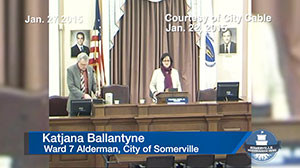 We have some interesting headlines for the latest Somerville Neighborhood News show, a community news production brought to you by the dedicated staff, volunteers and interns at Somerville Community Access TV. Here is one featured headline:
We have some interesting headlines for the latest Somerville Neighborhood News show, a community news production brought to you by the dedicated staff, volunteers and interns at Somerville Community Access TV. Here is one featured headline:
Calls for FRIT to build union at Assembly
By Yuxiao Yuan.
Area unions and labor leaders have decided to wage a campaign against Federal Realty Investment Trust (FRIT) for its recent decision to hire non-union labor to build a 448-unit apartment at the Assembly Square, and on Jan. 22, the Board of Aldermen joined the movement, voting a resolution urging FRIT to reverse its decision.
“We want to make sure that a project of this size scale, it will really benefit our community, and one of the ways is to make sure that it does is to make sure that the work is done union, and that the work will allow local residents not only to live here, but to work here as well,” Rand Wilson, Communications Director for Service Employees International Union 888 told Somerville Neighborhood News (SNN).
The apartment complex will rise on “Block 6” area of the Assembly Square redevelopment area. The redevelopment area received more than $80 million in public funding for the construction of the Orange Line MBTA station, infrastructure and roadways. But because the apartment building is a private, not a public development, it is not subject to the same rules as public construction jobs regarding hiring at “prevailing wage” which usually results in using union labor.
“Even though Federal Realty is benefiting from having the Orange Line here, and from all of the infrastructure that the city and the state has created here, it’s not a prevailing wage job,” Wilson explained. “So when the bidding occurs it’s not a level playing field between the good contractor that provides health care and pension benefits and training opportunities, and a contractor that’s making as much money as they can and is ready to exploit labor by any means necessary.”
Wilson helped a group of unions write and circulate an open letter published in the Somerville Journal. One of the workers quoted in the letter is Jaril Gauthier, a lifelong Somerville resident and a member of the Sheet Metal Workers union.
“It costs a lot of money to raise family in Somerville,” Gauthier, a father of four, told SNN. “If you work for union, at least they pay you good money and you can survive here.”
Gauthier said hiring union contractor would also benefit FRIT.
“Actually, we do good work. So you really get what you pay for,” he added.
Gauthier also said he hoped that City Hall would intervene on the issue.
But in a written statement sent earlier this month, Mayor Joseph A. Curtatone implied that his office was not going to question FRIT’s decision.
“The city has been and will continue to work to attract new construction jobs through community driven development,” the statement read, adding that “as conversations between the trades and the contractors arise with each new project, we will continue to facilitate those conversations.”
There was no mention of addressing the D-6 construction with FRIT.
But the city’s Board of Aldermen is not sitting still. On January 22, nine members of the board submitted a resolution that “strongly urges Federal Realty Investment Trust to employ union labor for all aspects of construction at Assembly Square and to give preference to qualified Somerville residents when hiring.”
“It’s something like $60 million dollars in bonds we’ve been giving to Assembly Square and I think that we have a right to say, ‘We’d like to see some local hire here, we’d like to see some union hire,’” Ward 1 Alderman Matt McLaughlin said at the Jan. 22 meeting, before the vote.
FRIT was also not available for an interview but did sent a written statement on Jan. 21.
Andrea Simpson, Director of Marketing & Tourism and head of Corporate Communications, said that the developer has “a strong track record of 100 percent union labor for our commercial project work at the Assembly Row development,” but that using union labor for the apartment building was too expensive.
“At the moment, we have not been able to find an innovative way to bridge the construction cost gap and Federal Realty is not willing to pass the excess cost onto future renters,” Simpson wrote.















Reader Comments